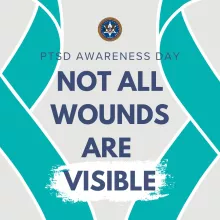
‘It happens all the time’ - USMS Recognizes National PTSD Awareness Day
By Emily Neece, Office of Public Affairs
This is a place holder for subtitle.
For immediate release
The United States Marshals Service (USMS) acknowledges June 27th as National PTSD Awareness Day in an attempt to reduce stigmatization about the disorder. According to the National Center for post-traumatic stress disorder, roughly 12 million Americans have post-traumatic stress disorder (PTSD) in a given year; however, only half of Americans with the disorder get diagnosed due to negative stereotypes.

PTSD is a mental health problem that occurs after experiencing or witnessing a life-threatening event. Because law enforcement officers face traumatic events as a part of their job, they are at greater risk of developing PTSD.
“Having a national awareness day allows everyone to focus on post-traumatic stress disorder,” said Deborah Eason, the Chief of the USMS Employee Assistance Program and a licensed clinical social worker. “It gives us the opportunity to provide resources and education around the topic, especially in the law enforcement community.”
In her role as Chief, Eason leads a team of clinicians to provide free counseling sessions for USMS employees and their families. The sessions are just one of the many resources offered by the EAP and serve as a reminder of US Marshals Service's daily commitment to strengthening mental health.
Eason says that misinformation about PTSD is one of the biggest reasons people do not seek a diagnosis. In her opinion, stigma is heavier within the law enforcement community due to fears of job preparedness.
“It happens all the time,” said Eason. “We have to dispel the myths and rumors that seeking out help is somehow a weakness.”
One way to support people with post-traumatic stress disorder is to get educated on the signs. According to the National Institute of Mental Health, common symptoms include nightmares, flashbacks, avoidance, restlessness, difficulty concentrating and feelings of fear, anger, guilt or shame. Symptoms generally emerge within three months of a traumatic event though it is important to understand that PTSD does not follow a fixed timeline.
“I think that the biggest myth is that people feel like they have to live with post-traumatic stress disorder,” Eason said. “PTSD is treatable.”
During counseling sessions, USMS clinicians use a variety of treatments including Prolonged Exposure Therapy, Cognitive Processing Therapy and Eye Movement Desensitization and Reprocessing.
National PTSD Awareness Day was first recognized in 2010 following the passage of a Senate resolution, making 2024 its 14th year.
If you believe you or a loved one have post-traumatic stress disorder, visit the National Center for PTSD for more resources on how to seek help.
Additional information about the U.S. Marshals Service can be found at https://www.usmarshals.gov.
####
America’s First Federal Law Enforcement Agency

